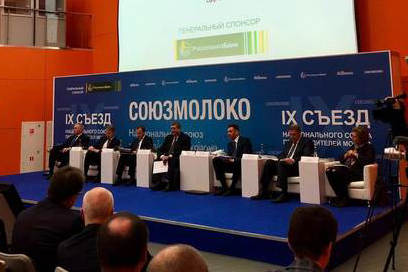Dairy production in Russia is finally on the rise, still more investments needed
Agriculture Minister Alexandre Tkachev is quoted as saying that the Russian agricultural sector will require an additional 10 billion-30 billion rubles this year, while the total amount of state support for the sector is stipulated to be 242 billion rubles in 2018 (1 euro=71.39 roubles, 10.02.2018) . This issue was raised during the meeting of Agriculture Minister and prime Minister Dmitry Medvedev on February 07th, 2018.

Several instruments will be used to allocate the money for agricultural producers. In 2017, for instance, Russian agricultural sector received about 8,000 soft loans which amount to 650 billion roubles. Out of this amount 450 billion rubles are investment loans, 50% more than in 2016.
The money will be used to build 54 greenhouse complexes with total capacity of 480,000 tonnes of vegetables a year and 91 dairy complexes with capacity for 500,000 tonnes of milk a year, as well as modernization of 108 processing enterprises and acquisition of over 4,000 units of farm machinery, including 1,500 combines and 415 tractors.
State support for dairy sector in particular was a record one in 2017, thanks to that raw milk production increased 3%. This figure was mentioned at the National Dairy Producers Union (Soyuzmoloko) congress in Moscow on February 06th, 2018. Despite that production of drinking milk, fermented dairy products and curd cheese fell down (3.1%, 5.8% and 1.7% respectively), while it increased for dairy products with high milk content: cheese and cheese products (8.5%), butter (7.1%) and milk powder (28.8%), said Chairman of Soyuzmoloko Andrey Danilenko.
Dairy husbandry has become attractive for investment due to the state support which is to be maintained and accessible for all dairy market players.

According to the Deputy Prime Minister Arcady Dvorkovich all support measures implemented last year will remain in force this year. The emphasis will gradually shift towards support for investment projects. At the end of last year all submitted dairy projects were approved, sometimes even partly at the expense of investment projects in other sub-sectors of agriculture (for instance, greenhouses).
Quality aspect in dairy production is still a hot issue. The Agriculture ministry has drafted a bill "On the Toughening of Administrative Liability for Violation of Technical Requirements for Food Products" which envisages twofold increase in fines for violations in labelling of foodstuffs (from 100,000-300,000 rubles to 200,000-400,000 rubles). Moreover under the draft bill a halt of the producer's activities is envisaged for up to 90 days, as well confiscation of produced goods, and, in the event of a repeat violation, confiscation of equipment for food production.
Currently, more than 3 million electronic veterinary certificates are processed daily. The Volga Region, Siberia and regions beyond the Urals have been particularly active in this regard, with Chelyabinsk, the Krasnodar region, Bashkortostan, Tatarstan and Novosibirsk in the lead. According to the minister, around 15 million certificates must be processed daily.
Another problem according to minister Tkachev is counterfeit products and grey imports.
In this respect Russia urged the Belarusian authorities to stop illegal shipments of milk from other countries through Belarus. Congress attendees said that illegal shipments via Belarus are creating difficulties for Russian producers as Belarussian goods are competing on price on the Russian market.
Electronic veterinary certification, not only for raw milk but especially for finished dairy products is a crucial instrument which will allow for product traceability, eliminating the possibility of re-export, and controlling dairy products from farm to shelf, minister Tkachev is quoted as saying at the Congress.
Aside from grey imports, (mainly re-exports from Ukraine, Latvia, and Estonia), export prices within the Eurasian Economic Union (EAEU) are also a cause for concern.
Another important issue is finding new export markets such as China, Africa, Middle East, parts of Japan and South Korea.
Logistics is a key issue in organizing these exports. The government is working out this topic with the railroad and with the companies that are engaged in logistics, even Russian Post could serve as one element of this chain.
Dairy Congress in Moscow praised for current Russian government support and positive growth figures in production and exports. Labeling is given priority. Dairy organizations call for attention to stimulate domestic demand for dairy, open up new sales markets in Asia and combat fraud.